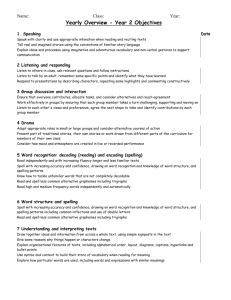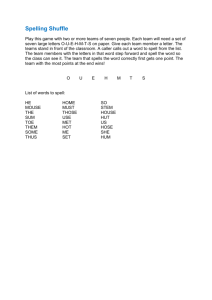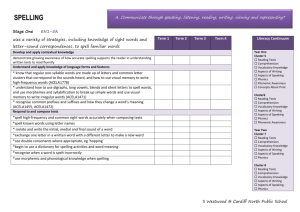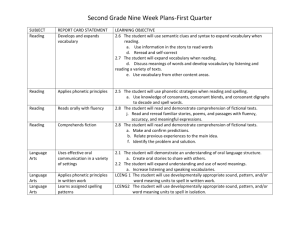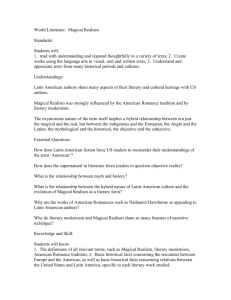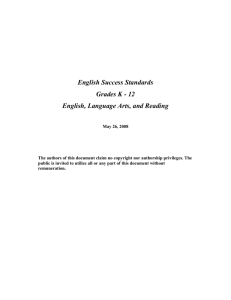Eighth ELA Core Curriculum
advertisement
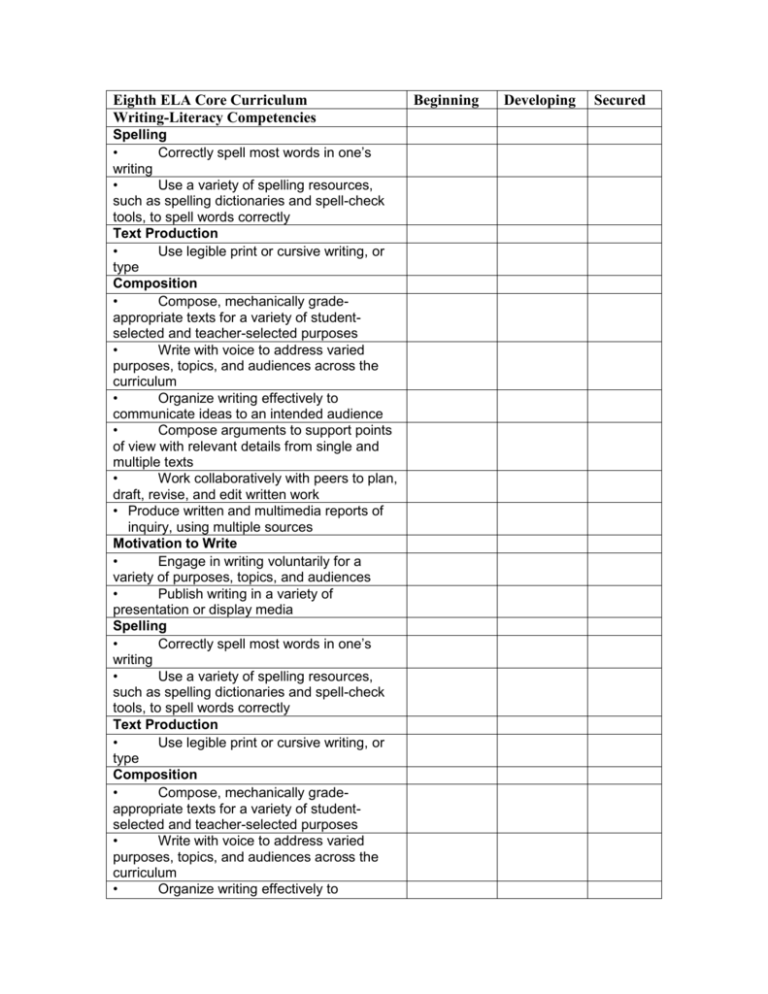
Eighth ELA Core Curriculum Writing-Literacy Competencies Spelling • Correctly spell most words in one’s writing • Use a variety of spelling resources, such as spelling dictionaries and spell-check tools, to spell words correctly Text Production • Use legible print or cursive writing, or type Composition • Compose, mechanically gradeappropriate texts for a variety of studentselected and teacher-selected purposes • Write with voice to address varied purposes, topics, and audiences across the curriculum • Organize writing effectively to communicate ideas to an intended audience • Compose arguments to support points of view with relevant details from single and multiple texts • Work collaboratively with peers to plan, draft, revise, and edit written work • Produce written and multimedia reports of inquiry, using multiple sources Motivation to Write • Engage in writing voluntarily for a variety of purposes, topics, and audiences • Publish writing in a variety of presentation or display media Spelling • Correctly spell most words in one’s writing • Use a variety of spelling resources, such as spelling dictionaries and spell-check tools, to spell words correctly Text Production • Use legible print or cursive writing, or type Composition • Compose, mechanically gradeappropriate texts for a variety of studentselected and teacher-selected purposes • Write with voice to address varied purposes, topics, and audiences across the curriculum • Organize writing effectively to Beginning Developing Secured communicate ideas to an intended audience • Compose arguments to support points of view with relevant details from single and multiple texts • Work collaboratively with peers to plan, draft, revise, and edit written work • Produce written and multimedia reports of inquiry, using multiple sources Motivation to Write • Engage in writing voluntarily for a variety of purposes, topics, and audiences • Publish writing in a variety of presentation or display media Writing Performance Indicators Standard 1: Students will read, write, listen, and speak for information and understanding. • Use several sources of information, in addition to an encyclopedia, to develop research reports • Identify appropriate format for sharing information with intended audience and comply with the accepted features of that format • Take research notes, using a notetaking process • Use outlines and graphic organizers, such as semantic webs, to plan reports • Include relevant and exclude irrelevant information • Use paraphrase and quotation correctly • Connect, compare, and contrast ideas and information from one or more sources • Support ideas with examples, definitions, analogies, and direct references to the text • Cite sources in notes and bibliography, using correct form • Write accurate and complete responses to questions about informational material • Maintain a portfolio that includes informational writing Standard 2: Students will read, write, listen, and speak for literary response and expression. • Write original literary texts to develop a narrative, using an organizational plan such as chronology or Beginning Developing Secured flashback sequence events to advance a plot; use action, conflict, climax, falling action, and resolution maintain a consistent point of view that enhances the message and/or establishes the mood select a genre and use appropriate conventions, such as dialogue, rhythm, and rhyme • Write interpretive and responsive essays of approximately three pages to express opinions and support them through specific references to the text demonstrate an understanding of plot and theme identify and describe characters and their motivations analyze the importance of setting identify and interpret how the use of literary devices, such as symbolism, metaphor and simile, alliteration, personification, flashback, and foreshadowing, affects meaning draw conclusions and provide reasons for the conclusions compare and contrast characters, setting, mood, and voice in more than one literary text or performance • Maintain a writing portfolio that includes literary, interpretive, and responsive writing Standard 3: Students will read, write, listen, and speak for critical analysis and evaluation. • Present clear analyses, using examples, details, and reasons from text • Present a hypothesis and predict possible outcomes from one or more perspectives • Select content and choose strategies for written presentation on the basis of audience, purpose, and content • Explain connections between and among texts to extend the meaning of each individual text • Compare and contrast the use of literary elements in more than one genre, by more than one author • Maintain a writing portfolio that includes writing for critical analysis and evaluation Standard 4: Students will read, write, listen, and speak for social interaction. • Share the process of writing with peers and adults; for example, write a condolence note, get-well card, or thank-you letter with a writing partner or in small groups • Respect the age, gender, social position, and cultural traditions of the recipient • Develop a personal voice that enables the reader to get to know the writer • Write personal reactions to experiences, events, and observations, using a form of social communication • Identify and model the social communication techniques of published writers • Maintain a portfolio that includes writing for social communication • Use the conventions of email


